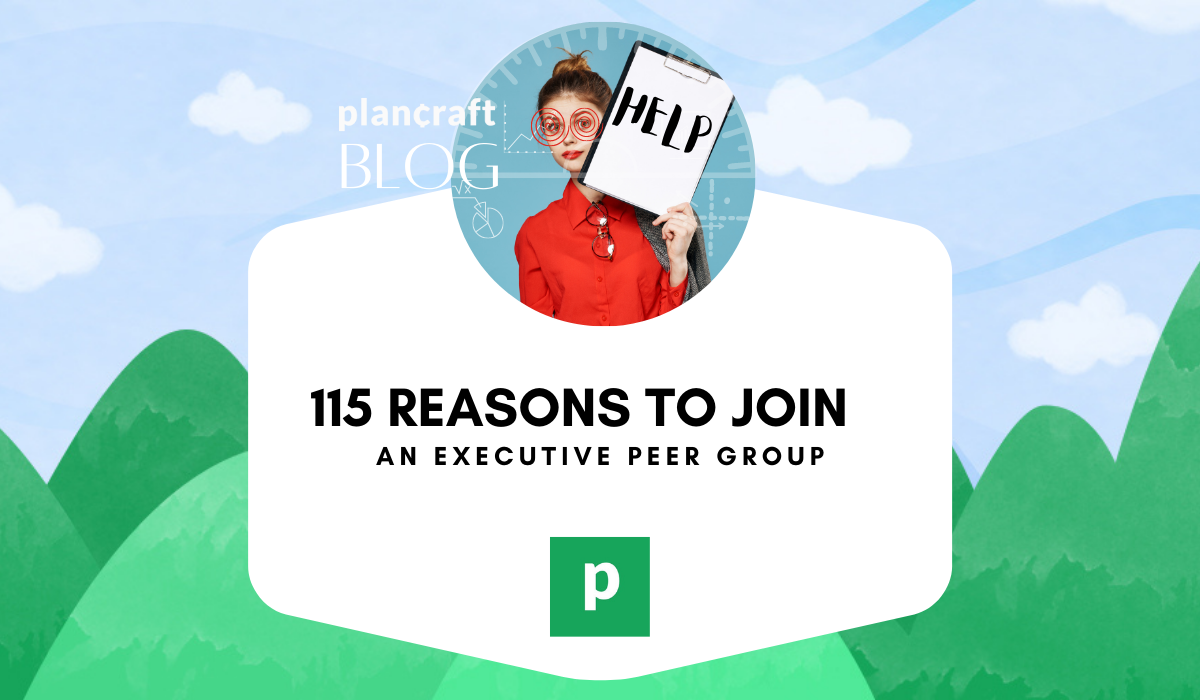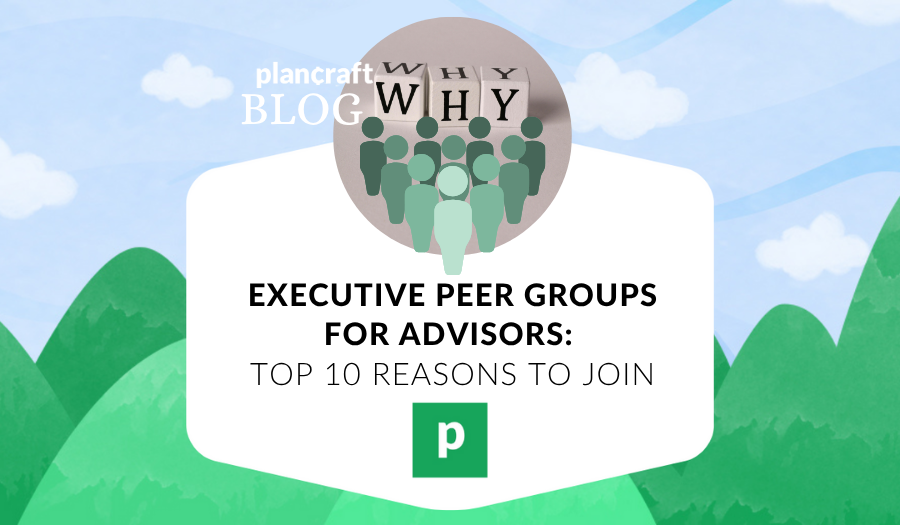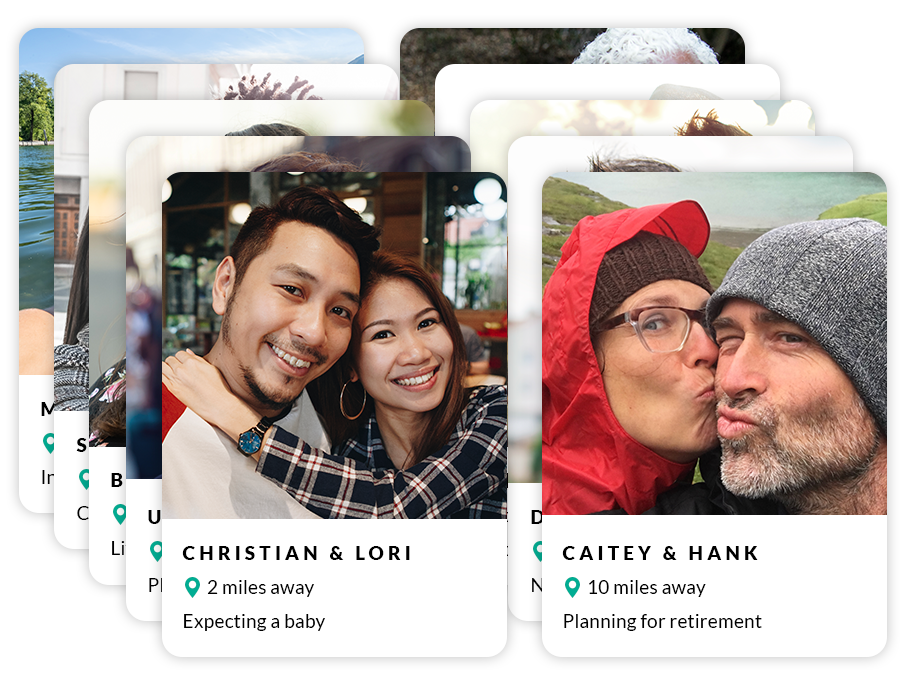You’re banging your head against the wall. Most days, you love your work as a financial advisor, but today, a subordinate made a costly error, a long-term client was upset, and three prospects ghosted you. The only thing to do now is to go home, pour a drink, and vent to your partner, right?
Although that might be a band-aid for today, handling the frustrations of the financial planning profession this way is not going to improve your professional or personal life. This is reason #42 for why you need an executive peer group.
Executive peer groups are designed to take your business to the next level through the support of like-minded peers. Your group meets on a regular basis to discuss pain points, set and achieve goals, share ideas, and explore the latest trends in the industry. The main focus is on your professional growth and development both as an advisor and as a leader.
"Something magical happens when you begin to share ideas with optimistic and ambitious like-minded people," says Ermos Erotocritou, CFP®, "Your idea may begin as a tiny spark. Something you thought of in passing but didn’t really explore. Then someone in your group suggests an idea to improve on your tiny spark. Then another suggestion and then another. From there your mind takes over and you begin to imagine all the possibilities. You blurt out a twist on your idea that only came to you because your peers opened your imagination. Like a road that seems to magically appear in front of you as you drive through the night with your headlights, it begins to unfold. The road of your imagination turns down paths you never thought possible."
As a leadership and performance coach, Ermos emphatically encourages advisors to get an army of positive people in their inner circles. "What would have happened if you shared your spark with a bunch of unmotivated, negative people? Your spark would have burned out the minute someone said 'That’s a terrible idea, it will never work.'”
"Your journey is an exciting one that gets your heart pumping as if you’re working out," he continues. "This process continues and evolves until you have that euphoric “aha” moment. And there it is… the idea that began as a tiny spark has evolved and grown into a burning hot inferno. You can feel it, see it, taste it. All of this happened and could only have happened with the help of your mastermind group. Like-minded, optimistic people who are craving to improve the world around them."
How it works
Although the purpose is always similar, not all executive peer groups run exactly the same way. Here at Plancraft, we meet monthly on video. At each meeting, we share a win to start the call on a positive note. Then, we dive into our challenges. Challenges can involve specific questions, professional goals, the nuts and bolts of running a business, or simply just a broad discussion about the direction of your career. Challenges I’ve heard include:
“I feel like I’m at capacity, but I don’t have time to find and train an assistant.”
“I’m feeling dissatisfied at my current company, but I make good money and I like my clients.”
“I want to double my AUM in the next 12 months.”
The majority of time is spent on challenges—discussing each other’s issues and providing support, feedback, and ideas. The facilitator will also ask each participant to share an update on the progress of their goals and ask, “What is one thing you plan to accomplish before we meet again?” Accountability is a major benefit of peer groups.
The Secret Sauce
Successful groups embrace the concept of collaboration over competition. We’re all here to grow and level up. We have hundreds of years of experience and combined brain power in one Zoom room—that’s some real problem-solving potential right there!
The secret sauce for our groups at Plancraft: all participants are financial advisors. These are colleagues that really understand the industry, pain points, and shared experiences. Often, they’ve had similar career paths. We believe it is important to have a support network of like-minded peers who can appreciate the highs and lows of the job and the nuance of certain situations. It’s that combined experience that is so conducive for growth. Someone may have experienced something similar and can share what worked or what didn’t. They’ll likely have resource recommendations, saving others hours and hours of independent research.
Another key ingredient in the secret sauce is a strong, dedicated facilitator. Their role is to support and empower the group, gently pushing participants to set higher goals and dig deeper into challenges. They’ll ensure the meetings run smoothly, take note of resources shared, and keep engagement strong and positive.
That’s an important word: engagement. A successful participant is an engaged participant. Executive peer groups are powerful, but it’s really a team effort amongst all participants.
Participating fully means being a little vulnerable, and that can be scary. However, groups are confidential so participants can share “the real stuff”. When we open up our minds and our ears, we can manage our lives and our businesses better.
Why join
When Planswell partners join an executive peer group, we ask on an intake form, “Why are you interested in joining?” This is important information to group them with folks who want the same things out of the experience. To my surprise, the reasons vary dramatically, yet each one is THE perfect reason to join. Check out these responses from a recent incoming cohort:
- To shorten the learning curve
-
To build a network to share referrals
-
To get ideas on how to approach prospective clients
-
To be successful
-
To better myself
-
To stop struggling in business
-
To make more money
-
To create relationships
-
To serve clients better
-
To get my drive back
-
To improve my closing ratio
-
To celebrate successes
-
To connect with people again after shutdowns
-
To have another tool in my toolbox
-
To help me transition back to work after extended time away
-
To accelerate growth
-
To get affirmation that I’m going in the right direction
-
To find advisors to partner with
-
To be more productive
-
To get help
-
To learn about marketing
-
To start succession planning
-
To hear HR best practices
-
To learn what I can do better
-
To get a mentor
-
To gain a support system
-
To practice lifelong learning
-
To learn from mistakes
-
To get encouragement
-
To feel comradery
-
To try something new
-
To workshop with peers
-
To improve my skills and knowledge
-
To be a better advisor
-
To learn something new after 40 years in the business
-
To socialize with other advisors
-
To gain knowledge from outside my organization
-
To learn how to gain my desired type of clients
-
To see what mastermind groups are all about
-
To scale up
-
To grow my connections
-
To not drink my frustrations away
-
To stop banging my head against the wall
-
To have good conversations
-
To enhance my strengths
-
To improve my weaknesses
-
To give back
-
To be around like-minded professionals
-
To get more diverse points of view
-
To improve the quality of my service
-
To kick-start growth after being stagnant
-
To fasttrack my career
-
To learn the ins and outs of the industry as a new advisor
-
To spend time with people who are excelling
-
To enjoy some fellowship
-
To get practical tips & tricks
-
To fuel a 90-day blitz
-
To add value to Planswell’s mission
-
To get collective wisdom from the group
-
To create a fire under me
-
To get fulfillment helping others
-
To get knowledge of real world events
-
To rise to the responsibility of being a leader in my firm
-
To elevate each other
-
To learn about trends in the marketplace
-
To accomplish my goals
-
To hone in on my personal beliefs
-
To develop my personal philosophy
-
To create action plans
-
To get motivated
-
To engage with my professional community
-
To get support
-
To contribute to others
-
To get new ideas
-
To collaborate with others
-
To get a break from the day-to-day grind
-
To elevate myself
-
To find my voice
-
To learn what’s working for others
-
To learn what didn’t work for others
-
To hear different points of view
-
To learn from more experienced advisors
-
To learn modern trends from younger advisors
-
To get the most out of Planswell
-
To learn best practices
-
To learn from peers how to better manage a practice
-
To learn how to get more client referrals
-
To learn how to overcome objections
-
To hear different perspectives
-
To learn to share experiences
-
To know I’m not alone in facing obstacles
-
To brainstorm ideas
-
To enjoy time with peers
-
To be held accountable
-
To maximize growth
-
To master this system's sales pitch
-
To share what I’ve learned with others
-
To meet advisors from my generation
-
To have a rewarding experience
-
To work on a common goal
-
To get coaching
-
To gain an outside perspective
-
To get best practices specific to Planswell
-
To expand my abilities as an advisor
-
To help other advisors
-
To follow the advice of my colleagues
-
To learn how to facilitate high-level discussions
-
To be a resource for others
-
To learn how to interact with the platform while on calls
-
To understand as many aspects of the value equation as possible
-
To learn better methods
-
To start over in my career
-
To work on my client onboarding process
-
To be more disciplined over long periods of time
- To meet my goal of bringing in three new accounts per month
We also ask about their previous experience in similar groups. Of those with peer group experience, one hundred percent said the opportunity was positive and valuable, and they were eager to join another.
I encourage you to give your spouse or partner a break by bringing your shop talk to an executive peer group. We’re eager to hear what’s on your mind.








.png)
